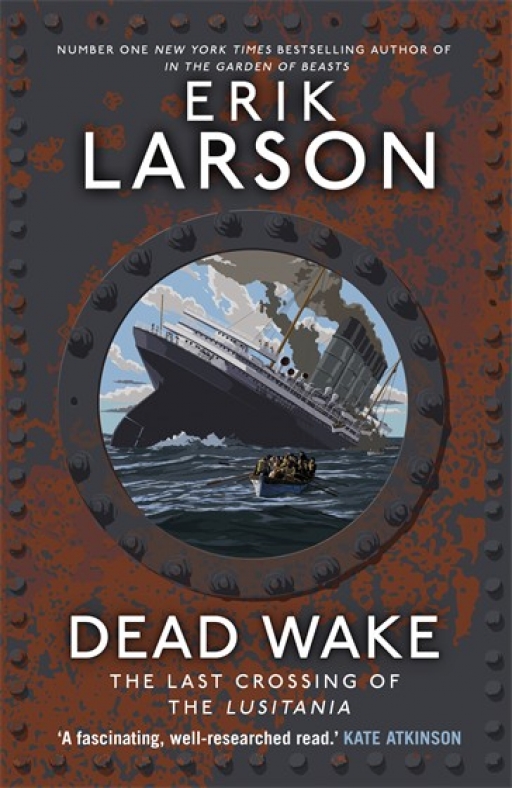Publisher’s Description:
‘On 1 May 1915, a luxury ocean liner as richly appointed as an English country house sailed out of New York, bound for Liverpool. The passengers – including a record number of children and infants – were anxious. Germany had declared the seas around Britain to be a war zone. For months, its submarines had brought terror to the North Atlantic.
But the Lusitania’s captain, William Thomas Turner, had faith in the gentlemanly terms of warfare that had, for a century, kept civilian ships safe from attack. He also knew that his ship – the fastest then in service – could outrun any threat. But Germany was intent on changing the rules, and Walther Schwieger, the captain of Unterseeboot-20, was happy to oblige. Meanwhile, an ultra-secret British intelligence unit were tracking Schwieger’s U-boat…but told no one. As U-20 and the Lusitania made their way towards Liverpool, forces both grand and achingly small – hubris, a chance fog, a closely-guarded secret and more – converged to produce one of the great disasters of 20th century history.
It is a story that many of us think we know but don’t, and Erik Larson tells it thrillingly, switching between hunter and hunted. Full of glamour, mystery, and real-life suspense, Dead Wake brings to life a cast of evocative characters, including the US President Wilson, a man lost to grief, dreading the widening war but also captivated by the prospect of new love. Gripping and important, Dead Wake captures the sheer drama and emotional power of a disaster that helped place America on the road to war.’
Centenary News Review:
Review by: Eleanor Baggley, Centenary News Books Editor
A ‘dead wake’, in maritime vernacular, is a trail of fading disturbance caused by a ship or torpedo. This fading trail was visible to passengers on board the Lusitania as the torpedo shot from the German submarine, U-20, made its way towards the hull of the famous Cunard liner on 7th May 1915.
Dead Wake is a fascinating study of the Lusitania’s final voyage. The perspective shifts between predator and prey, providing us with a detailed and engaging look at the events which preceded the torpedo attack. These shifts in perspective demonstrate the fragile state of the world in 1915 and give us a clearer understanding of the strange confluence of events which resulted in the death of almost 2,000 people. Larson is careful not to lay blame, rather he sets out a balanced and objective examination of the ships’s voyage and the politics and personalities that affected it.
One look at the bibliography demonstrates the depth and extent of Larson’s research, but you do not need the bibliography as proof. The breadth of his knowledge is evident throughout, as is his interest in the individual people involved.
The passengers are more than just numbers of lost and found, survivors and deceased, they are real people and Larson ensures we do not forget that. As the book progresses the narrative shifts from the passengers to Schwieger, the commander of U-20, to President Wilson, to the intelligence offers in Room 40 and back again. As the boat nears its destination and U-20 draws steadily closer, we become to know these people individually and their stories are picked up time and again.
We meet Boston bookseller Charles Lauriat who was carrying a rare volume of Charles Dickens’s ‘A Christmas Carol’ in his luggage. He survived and sent a telegram to his wife letting her know he had saved the pictures of his child as they had been his ‘mascot’ and that he regretted her ‘hours of suspense’. Then there was the architect and spiritualist Theodate Pope who travelled with her maid, Emily Robinson, and a friend. They chose to make the jump to the sea and with a ‘come, Robinson’, the two women stepped off the railing. Pope survived, just, but her maid and friend were not found.
Perhaps the most emotive passenger story was that of Richard Preston Prichard who, by all accounts, was generous and friendly to all. His body was never recovered, but his mother sent out flyers and pleas for information. A number of passengers who had come into contact with Preston responded, as did a few who had only had glimpses of the young man on deck, with words of consolation and remembrances of her son.
For me, Larson’s greatest skill is his ability to bring the captains, commanders and passengers to life beyond the page so that they are more than mere names in a history book. It is this, combined with the detailed and objective research, which makes Dead Wake a powerful addition to the study of the Lusitania’s final voyage.
What do you think about this book or review? Please add a comment below.
